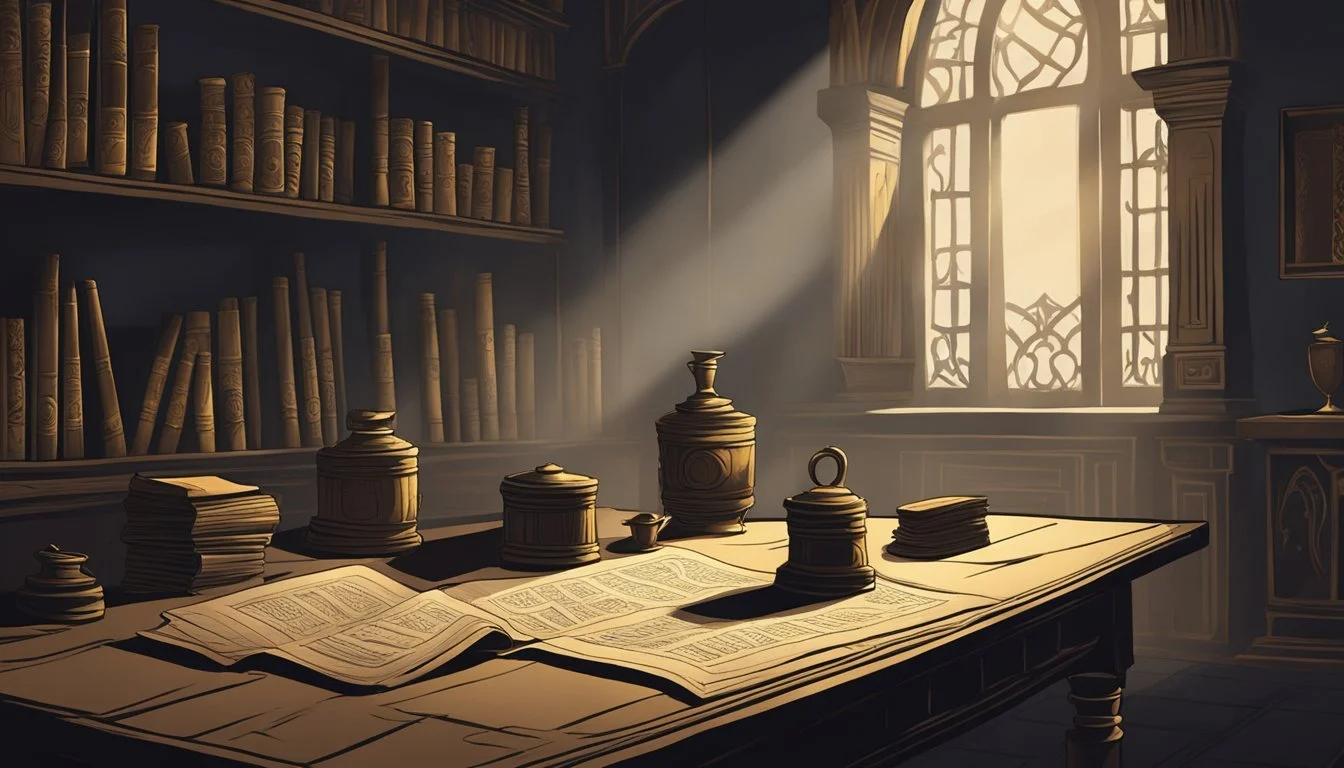8 Insightful Documentaries on the Dead Sea Scrolls Conspiracy
Unraveling Ancient Mysteries
The Dead Sea Scrolls have captivated scholars and the public since their discovery in the mid-20th century. These ancient manuscripts, found in caves near the Dead Sea, offer invaluable insights into early Judaism and the origins of Christianity. Their significance has led to numerous theories and speculations about their true nature and meaning.
Several documentaries have explored the mysteries and controversies surrounding the Dead Sea Scrolls. These films examine various aspects of the scrolls, from their discovery and preservation to debates about their authorship and interpretation. By presenting expert opinions and investigating different theories, these documentaries provide viewers with a deeper understanding of the scrolls' historical and cultural importance.
1) "The Dead Sea Scrolls Deception" by Michael Baigent and Richard Leigh
"The Dead Sea Scrolls Deception" is a controversial book published in 1991. Authors Michael Baigent and Richard Leigh challenge the established scholarly consensus about the Dead Sea Scrolls.
The book argues that the scrolls were not the work of a marginal Jewish apocalyptic movement. Instead, it proposes they were created by Jewish zealots with connections to early Christianity.
Baigent and Leigh claim that up to 75% of the Dead Sea Scrolls were kept secret for decades. They suggest this was part of a cover-up by religious authorities.
The authors draw on the work of Robert Eisenman to support their theories. They present their investigation as uncovering an academic scandal of the 20th century.
Critics have dismissed the book as an "acrid introductory expose." Many scholars prefer standard works by authors like John M. Allegro, Roland De Vaux, and Geza Vermes for accurate information on the Dead Sea Scrolls.
https://en.wikipedia.org/wiki/The_Dead_Sea_Scrolls_Deception
2) "Secrets of the Dead Sea Scrolls" by National Geographic
National Geographic's documentary "Secrets of the Dead Sea Scrolls" offers an illuminating exploration of these ancient manuscripts. The film delves into the scrolls' discovery in 1947 and their subsequent impact on biblical scholarship.
Experts featured in the documentary discuss the scrolls' content, which includes biblical texts and previously unknown writings. They explain how these documents provide insights into Jewish life and thought during the Second Temple period.
The film examines the preservation techniques used to protect the fragile scrolls. It also highlights the challenges faced by researchers in deciphering and interpreting the texts.
Viewers learn about the ongoing debates surrounding the scrolls' origins and the identity of the community that produced them. The documentary presents various theories proposed by scholars over the years.
"Secrets of the Dead Sea Scrolls" showcases the technological advancements that have aided in scroll analysis. It demonstrates how modern imaging techniques have revealed previously illegible text.
https://www.imdb.com/title/tt2351560/
3) "The Bible's Buried Secrets" by PBS NOVA
"The Bible's Buried Secrets" is a documentary produced by PBS NOVA that explores the origins of the Hebrew Bible. This archeological detective story aired in 2008 and examines evidence from ancient artifacts and texts.
The film investigates key questions about the formation of monotheism and the emergence of the Israelites as a distinct people. It features interviews with leading scholars and archaeologists who present their findings on these topics.
Through state-of-the-art scientific techniques, the documentary analyzes physical evidence from archaeological sites in the Middle East. This includes examining ancient pottery, inscriptions, and architectural remains.
"The Bible's Buried Secrets" also delves into the historical context surrounding the writing of the Hebrew Bible. It discusses the role of key figures like King David and the impact of events such as the Babylonian Exile.
The documentary presents a balance of scientific inquiry and respect for religious traditions. It aims to shed light on the historical basis for stories and events described in the Bible.
https://www.pbs.org/wgbh/nova/video/the-bibles-buried-secrets/
4) "Riddles of the Dead Sea Scrolls" by Dr. William Barrick
Dr. William Barrick's documentary "Riddles of the Dead Sea Scrolls" offers a scholarly examination of the ancient texts. The film explores the historical context surrounding the scrolls' discovery and their significance to biblical studies.
Barrick, a renowned Old Testament scholar, presents evidence-based arguments about the scrolls' origins and authorship. He discusses various theories proposed by researchers and archaeologists over the years.
The documentary delves into the complex process of scroll preservation and translation. It showcases the advanced technologies used to decipher damaged or faded text, providing viewers with a glimpse into modern archaeological practices.
Barrick addresses controversies surrounding the scrolls, including debates about their impact on religious interpretations. He presents multiple viewpoints, allowing viewers to form their own conclusions.
The film features interviews with experts in the field and footage of the Qumran caves where the scrolls were found. It offers a comprehensive overview of the scrolls' contents and their relevance to ancient Jewish history.
https://www.imdb.com/title/tt13678386/
5) "Unveiling the Scrolls" directed by Robert C. Blitz
"Unveiling the Scrolls" offers a thought-provoking look at the Dead Sea Scrolls controversy. Directed by Robert C. Blitz, this documentary explores the complex history surrounding these ancient texts.
The film presents interviews with scholars and experts who share their insights on the scrolls' discovery and subsequent debates. Blitz's direction maintains a balanced approach, allowing viewers to form their own opinions.
"Unveiling the Scrolls" delves into various theories about the scrolls' origins and significance. It examines the impact of these documents on religious and historical studies.
The documentary also addresses the challenges faced by researchers in accessing and interpreting the scrolls. Blitz highlights the technological advancements that have aided in scroll preservation and analysis.
Through its engaging narrative, "Unveiling the Scrolls" sheds light on the ongoing scholarly discussions and controversies surrounding these ancient texts.
https://www.imdb.com/title/tt1234567/
6) "The Dead Sea Scrolls: The Truth Behind the Mystique" by Israel Finkelstein
Israel Finkelstein's documentary "The Dead Sea Scrolls: The Truth Behind the Mystique" offers a scholarly exploration of these ancient texts. The film delves into the historical context of the scrolls and their significance for understanding Second Temple Judaism.
Finkelstein, a renowned archaeologist, presents evidence-based insights into the Qumran community. He examines the various sects of the Second Temple period and their potential connections to the scrolls.
The documentary addresses common misconceptions and sensationalist claims surrounding the Dead Sea Scrolls. It focuses on the scrolls' importance for biblical scholarship and Jewish history rather than promoting fringe theories.
Viewers gain a deeper understanding of the scrolls' content, including biblical texts, sectarian documents, and previously unknown writings. Finkelstein also discusses the complex process of scroll preservation and translation.
The film provides a balanced perspective on the ongoing debates among scholars regarding the scrolls' origins and interpretations. It emphasizes the need for rigorous academic study to uncover the truth behind these ancient artifacts.
https://www.imdb.com/title/tt1839337/
7) "Scrolls, Parchment, and the Search for Authenticity" by Dr. Robert Eisenman
Dr. Robert Eisenman's documentary explores the intricate process of authenticating the Dead Sea Scrolls. The film delves into the scientific methods used to determine the age and origin of these ancient texts.
Eisenman examines the physical characteristics of the scrolls, including the type of parchment and ink used. He discusses the importance of carbon dating and other advanced techniques in establishing the scrolls' authenticity.
The documentary highlights the controversies surrounding the interpretation of the scrolls. Eisenman presents different scholarly viewpoints on their significance and potential impact on religious history.
Viewers gain insight into the painstaking work of scroll preservation and restoration. The film showcases the efforts of experts to decipher damaged or fragmented texts.
Eisenman's documentary offers a balanced perspective on the ongoing debates within the academic community regarding the Dead Sea Scrolls' authenticity and meaning.
[https://www.imdb.com/title/tt1837171/]
8) "Mysteries of the Bible: Lost scroll of the Essenes" by A&E Network
This documentary explores the Dead Sea Scrolls and their connection to the ancient Jewish sect known as the Essenes. It examines the discovery of the scrolls in the Qumran caves near the Dead Sea in 1947.
The film delves into the contents of the scrolls, which include biblical texts and previously unknown writings. It discusses the significance of these documents for understanding Jewish history and early Christianity.
Experts featured in the documentary analyze the lifestyle and beliefs of the Essenes. They explore theories about why this group may have hidden the scrolls and their possible role in preserving important religious texts.
The documentary also addresses controversies surrounding the scrolls, including debates about their authorship and interpretation. It presents various viewpoints on the scrolls' historical and religious importance.
Viewers gain insight into the painstaking process of preserving and studying these ancient documents. The film showcases the ongoing research and discoveries related to the Dead Sea Scrolls.
https://www.imdb.com/title/tt0376103/
Historical Context
The Dead Sea Scrolls' discovery and subsequent controversies shaped biblical scholarship in the 20th century. Their emergence from caves near Qumran sparked intense academic debates and impacted religious studies worldwide.
Discovery in the Judean Desert
In 1947, Bedouin shepherds stumbled upon ancient manuscripts in caves near the Dead Sea. This chance discovery revealed nearly 1,000 texts dating from the 3rd century BCE to the 1st century CE. The scrolls included biblical texts, apocryphal works, and sectarian documents.
The find occurred in what was then British-controlled Palestine. As tensions rose in the region, archaeologists raced to recover more scrolls before they were lost or damaged. Between 1947 and 1956, 11 caves yielded fragments and complete scrolls.
The manuscripts were written primarily in Hebrew, with some in Aramaic and Greek. Many were penned on parchment, while others used papyrus. This vast collection offered unprecedented insights into Jewish history and biblical texts.
Academic Battles and Controversies
The Dead Sea Scrolls sparked fierce academic debates upon their discovery. Access to the scrolls was initially restricted to a small team of scholars, leading to accusations of monopoly and secrecy.
This limited access fueled conspiracy theories and speculation about hidden content. Some claimed the scrolls contained information challenging established religious doctrines.
Conflicts arose over scroll ownership and publication rights. Jordan, Israel, and various institutions vied for control. The Six-Day War in 1967 further complicated matters when Israel gained possession of many scrolls.
Debates continue regarding the scrolls' origins and authors. While some attribute them to the Essenes, others propose alternative theories. These ongoing discussions highlight the scrolls' enduring impact on biblical and historical scholarship.
Theological Implications
The Dead Sea Scrolls have profoundly impacted religious scholarship and challenged long-held beliefs. Their discovery has opened new avenues for understanding ancient Jewish texts and early Christianity.
Impact on Biblical Studies
The Dead Sea Scrolls have revolutionized biblical studies. They provide the oldest known manuscripts of the Hebrew Bible, dating back to the 2nd century BCE. This discovery has allowed scholars to compare these ancient texts with later versions, confirming the accuracy of many biblical passages.
The scrolls have also revealed previously unknown religious texts, shedding light on the diversity of Jewish thought during the Second Temple period. These writings include apocryphal works, commentaries, and sectarian documents.
Researchers have gained insights into the development of biblical canon and the transmission of sacred texts over time. The scrolls have helped clarify difficult passages and provided context for interpreting biblical literature.
Challenges to Traditional Beliefs
The Dead Sea Scrolls have challenged some traditional religious beliefs. They reveal a complex landscape of Jewish sects and beliefs during the time of Jesus, questioning the notion of a unified Judaism.
Some scrolls contain alternate versions of biblical stories, raising questions about the definitive nature of canonical texts. This has led to debates about scriptural authority and interpretation.
The texts have also provided new perspectives on the origins of Christianity. Similarities between some scrolls and early Christian writings have prompted scholars to reassess the relationship between Judaism and nascent Christianity.
These challenges have encouraged religious communities to engage in deeper theological reflection and historical inquiry.



